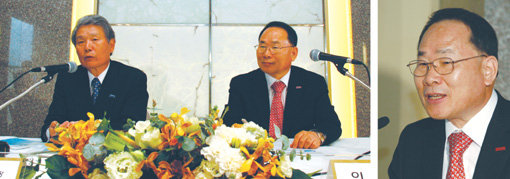Toray Advanced Materials Korea to Tap into Carbon Fiber Business
Unveils its Vision 2020 calling for quadrupling sales in 10 years

Toray Saehan, a textile maker marking its 10th anniversary, has changed its name to Toray Advanced Materials Korea Inc. and announced a decision to make a foray into the carbon fiber business.
Toray Industries CEO Sadayuki Sakakibara and Lee Young-kwan, president of Toray Advanced Materials Korea, told reporters at the Seoul Plaza Hotel on April 22 that the Korean unit has changed its name to Toray Advanced Materials Korea, indicating its determination to aim at becoming a global maker of advanced materials.
Toray Saehan was established as a joint venture in October 1999 by Toray Industries of Japan and Korea¡¯s Saehan Industries Inc. at an ownership ratio of 6:4, favoring the Japanese side. It has become a company wholly owned by Toray Industries, as Saehan Industries was handed over to the Woongjin Group in accordance with Saehan Industries¡¯ workout and stake changes.
Its name change to Toray Advanced Materials Korea reflects Toray Industries¡¯ willingness to go all out for the advanced materials business, emerging as a growth engine, departing from the old image of Saehan Group, officials said.
Toray Industries unveiled its Vision 2020 calling for transforming Toray Advanced Materials Korea into an advanced materials company capable of posting 3.5 trillion won in sales and 385 billion won in operating profit within 10 years.
To this end, it decided to invest 2.32 trillion won including 140 billion won in R&D outlays over the next 10 years.
Toray Advanced Materials Korea disclosed its specific plans to focus on tapping the areas of carbon fiber water treatment for coping with a shortage of water, photovoltaic materials and components for rechargeable batteries.
Initially, Toray Industries, the world¡¯s carbon fiber maker, plans to transfer the related technology to Korea.It confirmed a decision to construct a third Toray Advanced Materials Korea plant in Gumi to produce the carbon fiber TORAYCA, a core material for low-carbon, green growth, in accordance with a request by the Korean government.
By investing 480 billion won in the next decade, Toray Advanced Materials Korea plans to increase sales to 500 billion won annually in the carbon fiber composites business by 2020.
Toray Advanced Materials Korea plans to venture into the water treatment business. It plans to introduce Toray Industries¡¯ membrane technology to produce a variety of filters for desalination, the reuse of tap water and waste water and to conduct other water treatment projects such as engineering and construction.
Currently, Toray Industries supplies carbon fiber for Boeing 787 Dreamliner and Airbus aircraft fuselages and components. Carbon fiber has been recognized globally as an environmentally-friendly material that can conserve energy by reducing the weight of automobiles, ships and wind power components and materials.
Toray Advanced Materials Korea¡¯s entry into the carbon fiber sector is expected to have spillover effects for related downstream and upstream industries by tapping the advanced parts materials market.
WATER TREATMENT BUSINESS ¡ª Toray Advanced Materials Korea plans to make inroads into the water treatment business since the water resources sector is emerging as a futuristic growth engine, as the world will have to grapple with a shortage of water, caused by global warming and a rising world population. Currently, the filter, engineering and construction project market has great potential with an annual growth rate of about 10 percent, while the membrane market for water treatment has strong potential with an annual growth rate of an estimated 10 percent. The market is big with diverse applications. The company plans to execute the water treatment project using its technology dubbed Micro Filtration (MF). Toray Advanced Materials Korea aims at developing the business into one that can rake in 350 billion won annually by 2020.
PHOTOVOLTAIC POWER MATERIALS ¡ª The photovoltaic module material market, which is oligopolistic, is a field with high demand for localization. The value of the global back sheet and ethylene vinyl acetate (EVA) sheet market is predicted to grow to some 2 trillion won by 2012, while that of the domestic market is forecast to surge from the current 71 billion won to about 500 billion won by 2020. Toray Advanced Materials Korea will have business portfolios covering all film materials related to photovoltaic power by making a foray into the EVA sheet sector, on top of the base film and back sheet for photovoltaic power now under development. By ramping up global marketing activities of the photovoltaic power material field, an area of swift commercialization through technology transfer, Toray Advanced Materials Korea aims at raising sales in the sector to 120 billion won by 2020.
The new and renewable energy industries are expanding to replace the conventional energy industries, and the demand for rechargeable batteries of such environmentally-friendly cars as hybrid electric vehicles (HEV) and electric vehicle (EV) is on the rise.
Samsung SDI and LG Chem are predicted to be on top in the market by 2010, and the value of the lithium-ion phosphate (LFP) and the lithium-ion battery separator market is forecast to grow to 300 billion won in 2010 and 900 billion won in 2015.
Toray Advanced Materials Korea is seeking to jointly develop related materials in cooperation with HEV and EV lithium-ion rechargeable battery makers and forge a partnership with them to push for LFP projects. The company aims to post 230 billion won in sales in 2010 by investing 136 billion won. nw
Toray Industries CEO Sadayuki Sakabikibara and Toray Advanced Materials Korea President Lee Young-kwan reveal Toray Advanced Materials Korea¡¯s ¡°Vision 2010.¡± (right) Toray Advanced Materials Korea President Lee announces his company¡¯s plan to tap into the carbon fiber and rechargeable battery businesses. .
3Fl, 292-47, Shindang 6-dong, Chung-gu, Seoul, Korea 100-456
Tel : 82-2-2235-6114 / Fax : 82-2-2235-0799